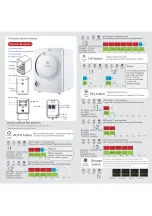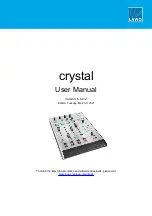
Atom Operator Manual
Scenes
LSC Lighting Systems (Aust) Pty. Ltd.
19
Fade Times
Both the IN time and the OUT time may be individually recorded as being controlled by their respective Time
fader (default setting) or they may have a time set in memory.
•
If a time is recorded as being set by the Time fader, then when the scene is replayed, the submaster
controlling the scene will use the current setting of the appropriate time fader. This allows you to use the IN
and OUT Time faders to adjust fade times “on the fly”.
•
If a set time is recorded, this is a fixed time exclusive to the scene. A scene may even have a set IN time
and a Fader OUT time or vice versa.
See “FADE TIMES” in the “FADE TIMES AND CHANNEL LEVELS” chapter for more details on the operation
of fade times.
Repeated presses of [FUNCTION] will cycle the display through the IN time setting, the OUT time setting and
the prompt for you to enter a Scene number. When either of the time settings are indicated, the EDIT wheel
lights to show that it is active. Rotate the EDIT wheel to set the desired time. The maximum time is 120
seconds (2 minutes) and the minimum time is 0 seconds. When a time is set
lower
than 0 seconds, it reverts
to “Fad” (IN or OUT time Fader) control.
Set the desired times then ensure that the lighting “Look” on the output of the Atom is as you require and
complete the recording (take a snapshot of the Atom’s output), by pressing;
[S/A] (Scene number)
The display briefly displays the recorded Page/Scene number.
Note; Recording over an existing chase or scene number will erase the previous contents.
Hint; Comprehensive recording of scenes as described above takes several keystrokes to complete
and would be time consuming when time is short, such as in a fast moving rehearsal where you need
to quickly create a look, record it as a scene and immediately create the next look. If this is the case,
you may use the rapid recording method described above and then when time permits, edit the
scenes to set the desired fade times.
Hint; You may connect a VGA monitor (optional), Video Terminal or a Computer to the Atom. When a
scene is recorded, the display automatically displays the times and channel levels of the new scene.
Abandoning A Recording
When you have created your look, pressed [RECORD] (SCENE), set the fade times and/or selected a page,
you still have one last chance to abandon the scene you are recording with out destroying any previous
contents of the scene.
To abandon RECORD SCENE without making any changes press;
[RECORD] (SCENE) a second time.
Blind Recording
Scenes may be created blind (not appearing on the output) by editing a scene number that is no longer
required. Simply PREVIEW/EDIT the scene number and
create
the scene by setting channel levels and fade
times using the
editing
functions. See “EDITING A SCENE” below for details.
Hint; If you might be required to record several “blind” scenes during a performance, make some
preparations by recording a blank scene (no channels on) in a spare scene number, say page 9 scene
12. When a blind recording is needed, copy your blank scene to the page/scene for the blind
recording then turn on the required channels by Preview/Editing the copy of the blank scene.
8.3 Replaying Scenes
Scenes may me replayed on the Submasters (in Scene mode) or on the Grab master (in any mode).
Scene Mode
When you select scene mode or change pages whilst in scene mode, the scenes or chases in the selected
page are assigned, in order, to their respective Submasters, 1 to 12 (24).
Note; Mode/Page freeze rules apply. See the “MEMORY STRUCTURE” chapter for more details.
Any one of the 9 pages may be selected as the
current
page by using the PAGE key.
Press [PAGE] to increment to the next page, or to switch
directly
to a page;
Press and hold [PAGE], Tap [S/A] (Page number).
















































